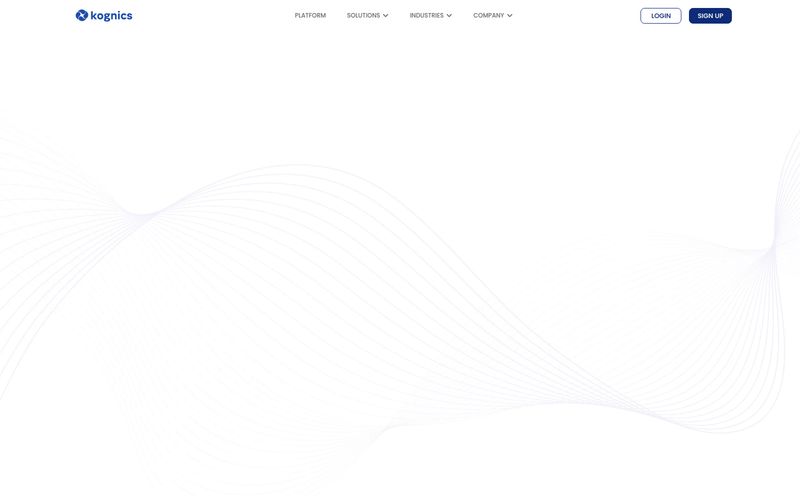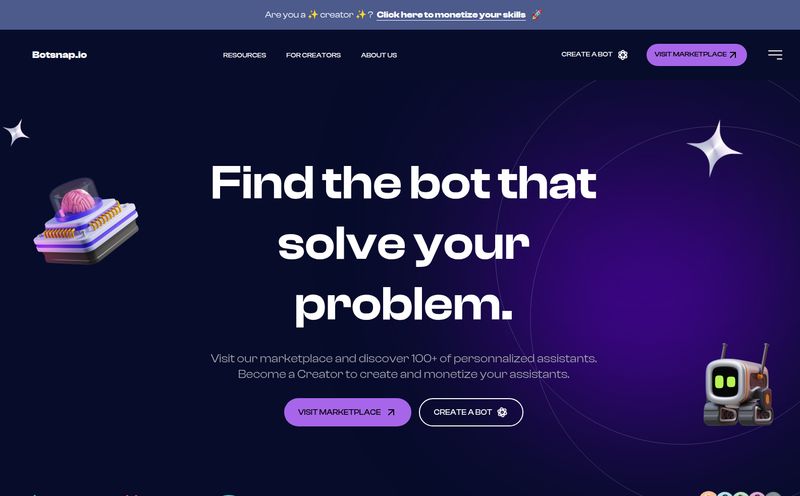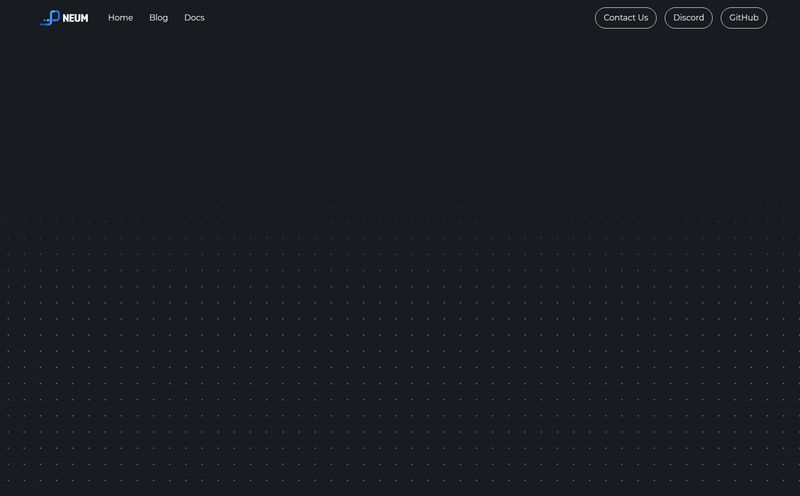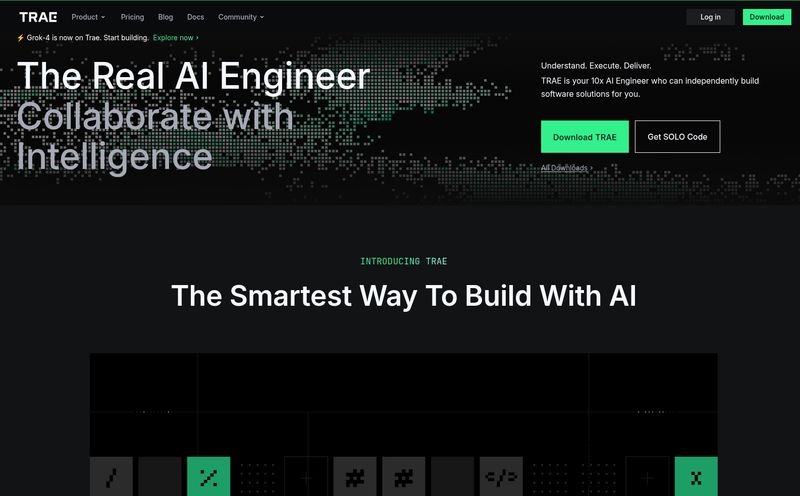The AI world often feels like it's split into two camps. On one side, you have the wizards—the developers and data scientists who speak in Python, fine-tune models in their sleep, and build incredible things. On the other side, you have... well, the rest of us. People who see the potential of AI but get a little glassy-eyed when someone mentions 'API endpoints' or 'prompt engineering'. We just want a tool that does the cool thing without needing a computer science degree.
For years, bridging that gap has been the holy grail. I’ve seen so many platforms try and fail. They're either too technical for the average person or too restrictive for the serious developer. It's a tough nut to crack. So when I stumbled upon a new platform in beta called Abyss, my curiosity was definitely piqued. Their whole pitch is about creating a hub for AI-powered solutions, a place where developers can sell their creations and everyday users can actually use them. An intriguing idea, but is it just another drop in the ocean?
So, What Exactly is This Abyss Platform?
Think of Abyss less as another chatbot and more like an Etsy for AI tools. It's a marketplace. It’s a specialized App Store for small, focused artificial intelligence applications. The entire ecosystem is built around a simple, yet powerful concept: AI Widgets.
These aren't the weather widgets on your phone's home screen. In the Abyss world, an AI Widget is a self-contained application built by a developer to perform one specific task really, really well. It could be a widget that generates perfectly formatted blog outlines, one that analyzes customer feedback for emotional tone, or even a fun one that creates dad jokes on demand. You find a widget that solves your problem, you run it, and you get your result. Simple as that.
The platform cleverly splits its audience into two groups:
- Innovators: These are the builders, the coders, the Python-savvy folks who are creating the AI Widgets.
- Explorers: These are the users, the marketers, the writers, the small business owners—anyone who wants to get a job done using AI without getting their hands dirty with code.
It's this symbiotic relationship that forms the core of the platform. One group builds, the other uses, and the platform facilitates the exchange. A classic marketplace model, but for a very modern product.
Making AI Clickable for the Rest of Us
As an SEO guy, I spend a ton of time on repetitive tasks. Keyword research, content clustering, generating meta descriptions... you name it. I've built my own little scripts over the years to help, but they're clunky and just for me. The idea of having a library of pre-built tools is incredibly appealing.
This is where Abyss aims to shine for the “Explorers.” The big promise is that you don't need any special technical knowledge. You don't have to learn how to write the perfect prompt for GPT-4 or Claude. The developer who built the widget has already done that heavy lifting. They've baked the logic, the prompts, and the secret sauce right into the widget itself. You just provide your input—like a topic for a blog post or a chunk of text to summarize—and click a button.
The Magic of Single-Purpose AI Widgets
The beauty of this model is its focus. Instead of one giant, do-everything AI that you have to wrestle with, you get a collection of specialized tools. This is a game-changer for productivity. Imagine having a personalized dashboard with widgets for:
- Creating social media posts from a blog URL.
- Generating five different email subject lines for a marketing campaign.
- Turning meeting transcripts into a concise summary with action items.
- Checking a piece of text for brand voice consistency.
This is the kind of practical, day-to-day AI implementation that most people actually need. No fluff, just function.
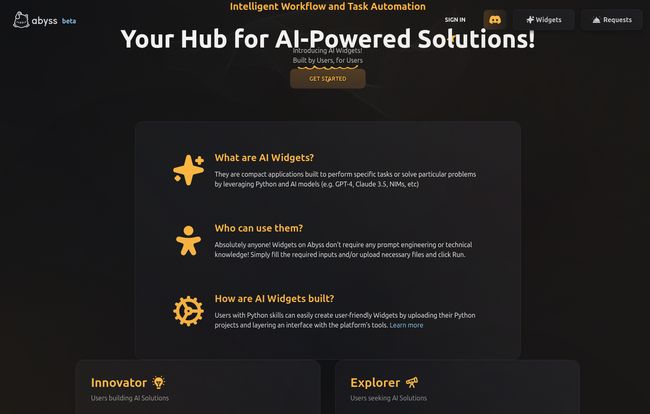
Visit Abyss
A New Monetization Path for Python Developers
Okay, let's flip the coin and look at this from the “Innovator's” perspective. If you're a developer who's been tinkering with AI models, you know the pain. You build a cool script that automates something awesome. Now what? To turn it into a product, you have to build a user interface, handle user authentication, figure out hosting, set up a payment processor... it's a massive headache. Most indie projects die right there.
Abyss steps in and says, “Hey, just bring us your Python code. We'll handle the rest.” This, for me, is the most exciting part of the platform. It provides the infrastructure to turn a script into a saleable product. They even give developers a personal Studio page, which acts as a mini-storefront to market their widgets and build a personal brand. It’s a genuine opportunity to monetize a skill without the overhead of becoming a full-blown SaaS company.
The Byssium Economy and How You Pay
Nothing is truly free, especially not the computing power needed to run large AI models. Abyss handles this with an in-store credit system called Byssium. It sounds a bit like a currency from a sci-fi movie, but the concept is straightforward. Every time you run a widget, it costs a certain amount of Byssium. Simple widgets might cost a little, more complex ones will cost more.
You can buy Byssium credits as you go or get a monthly allowance if you subscribe to their premium plan. I actually like this model. It's more transparent than some subscription plans where you're not sure how much you're “allowed” to use the service. Here, you know exactly what each action costs.
Breaking Down the Abyss Pricing Plans
The platform currently offers two tiers, which is refreshingly simple.
| Plan | Cost | Key Features |
|---|---|---|
| Abyssian Free | $0 / month | Create & deploy widgets, request new widgets, run widgets (by purchasing Byssium), personalize your Studio. A great way to get your feet wet. |
| Abyssian PRIME | $14.99 / month | Everything in Free, plus a 10% discount on all widget runs, a monthly credit of 1500 Byssium, exclusive avatar customizations, and priority access to new features. |
The free plan is genuinely useful, letting you test the waters as either a creator or a user. The PRIME plan seems like a no-brainer for anyone who plans to use the platform regularly. That 1500 Byssium monthly credit and the 10% discount could easily make the subscription pay for itself if you're a power user.
The Good, The Not-So-Good, and The Big Question
No platform is perfect, especially one still in beta. After digging in, here's my take.
What I'm Genuinely Excited About
I love the democratization aspect. It's a genuine bridge between the coding wizards and the rest of us. The monetization angle for indie developers is brilliant and desperately needed. And the Request system, where users can ask for specific widgets, creates a fantastic feedback loop. It ensures that developers are building things people actually want. That’s smart business.
Some Potential Sticking Points
Let's be honest, its success hinges entirely on a classic chicken-and-egg problem. It needs a critical mass of high-quality widgets to attract users, but it needs users to attract the best developers. It's a tough balancing act. Also, the requirement for Python skills on the developer side, while understandable, does limit the pool of creators. And for users, the Byssium credit system, while fair, might take a little getting used to compared to a flat-rate subscription.
So, Is Abyss Worth a Look?
My verdict? Absolutely. It’s one of the most interesting and practical approaches to the “AI for everyone” problem that I’ve seen in a while. It’s not trying to be a massive, all-knowing oracle. It’s trying to be a really good toolbox, and I think that’s the right call.
For developers, it's a low-friction way to test, deploy, and potentially monetize your AI projects. The barrier to entry is significantly lower than going it alone.
For non-technical users, marketers, students, and small businesses, it’s a potential goldmine of productivity tools that you can use without writing a single line of code.
Since there's a free plan, there’s really no reason not to sign up and poke around. Go be an Explorer. See what widgets are there. Maybe even request one. You might just find that perfect little tool that solves a nagging problem you've been having. It's an ambitious project, and I, for one, will be watching its evolution closely.
Frequently Asked Questions
- Do I need to be a programmer to use Abyss?
- Not at all! As a user (an "Explorer"), you can browse and run any of the AI Widgets on the marketplace without any coding knowledge. The whole point is to make these tools accessible.
- What is Byssium and how do I get it?
- Byssium is the platform's credit system used to pay for running AI Widgets. You can purchase Byssium credits directly, or you get a monthly allowance of 1500 Byssium if you subscribe to the Abyssian PRIME plan.
- Can I actually make money on Abyss?
- Yes, that's a primary feature for developers (or "Innovators"). If you can code in Python, you can build AI Widgets and publish them to the marketplace for others to use, earning money when they run your widget.
- What AI models can be used in Abyss Widgets?
- The platform documentation mentions developers can build with powerful models like GPT-4, Claude 3.5, NiMI, and others. This gives creators a lot of flexibility and power.
- What if I need an AI tool that doesn't exist on the marketplace?
- Abyss has a "Requests" feature for this exact situation. You can submit a request for a specific type of widget you need. This not only helps you get a solution but also gives developers inspiration for new, in-demand tools to build.
- Is the Abyssian PRIME plan worth the $14.99 cost?
- In my opinion, if you find yourself using even a few widgets regularly, it's likely worth it. The combination of 1500 free Byssium credits per month and the 10% discount on all widget runs can quickly offset the subscription cost for an active user or developer.
Conclusion
Abyss is stepping into a crowded space but with a unique and well-thought-out angle. By focusing on being a marketplace and a facilitator rather than another AI chat tool, it carves out a very interesting niche. It empowers individual creators and makes powerful AI genuinely practical for a much wider audience. It’s still early days, but the foundation is solid. Go check it out and see for yourself.
Reference and Sources
- Abyss Official Website: abyss.com (Note: This is a placeholder URL as the actual one might not be standard. Please refer to the source images for the current live URL).
